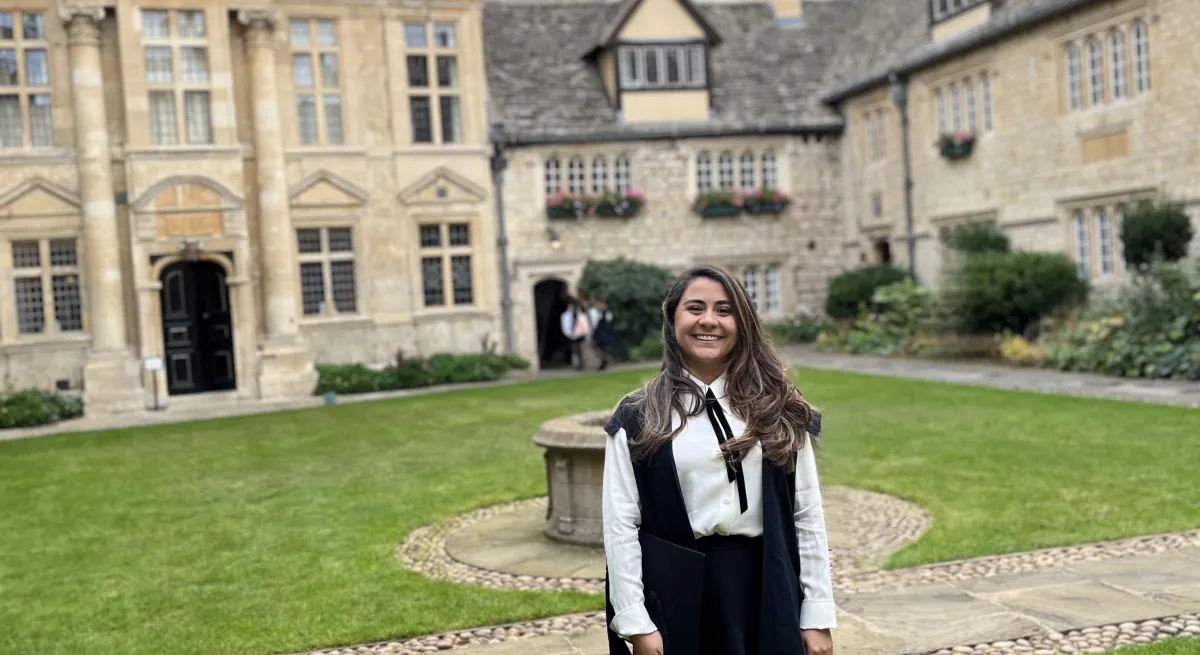Access to quality education plays a significant role in overcoming the barriers to income and opportunity caused by wealth inequality. Access to elite education even more so: Education at a prestigious institution can significantly enhance social mobility by providing access to unparalleled resources, networks, and opportunities that may otherwise be out of reach. Julius Baer, together with the Weidenfeld-Hoffmann Trust, supports postgraduate scholars from developing and emerging countries to pursue fully-funded graduate studies at the University of Oxford alongside a comprehensive programme of leadership development, long-term mentoring and networking. The ultimate objective: Empowering future leaders to create impact and opportunity for their communities and countries.
This series of articles by programme alumni aims to share their views and insights on their experience and how the knowledge and experience they gained at Oxford and beyond has influenced their own world views and equipped them to affect positive change in the social, political or economic development of their community or country.

Guatemala is where education is often seen as the gateway to a better life - yet for many, that door remains closed. With only 4.6% of the population attaining a university degree and a mere 0.5% reaching a master’s or PhD the reality is clear-cut: higher education is a privilege, not the norm. In a nation where economic opportunities remain concentrated in low-skill industries, the value of advanced education is constantly questioned. Those who pursue higher degrees frequently find themselves in a paradox - overqualified for local jobs, yet unable to change the structural conditions that limit economic mobility.
I am part of that small percentage of Guatemalans who have managed to break through; As a first-generation university graduate and a recipient of the St Edmund Hall Julius Baer postgraduate scholarship, I had the opportunity to study at the University of Oxford, an experience that reshaped my understanding of public policy and economic development. Yet, upon returning home, the familiar structural constraints remain unchanged: an economy that does not generate sufficient demand for skilled professionals, and a labour market that discourages investment in advanced education.
Guatemala’s struggle is not unique. Across the region, countries find themselves trapped in a cycle where the lack of highly skilled human capital prevents the development of industries that require it, and in turn, the absence of those industries discourages investment in higher education. Our elected government is faced with the challenge of creating a scalable plan that guarantees economic opportunities to prevent mass migration to the north. At the same time, it is trying to reduce the most extreme vulnerabilities of poverty and chronic malnutrition that affect at least half of the children in the country. We are faced with that paradox - how Guatemala’s economic and educational systems reinforce each other’s limitations, and how my master’s challenged me to contribute to work on these issues.
The Educational and Economic Paradox
In Guatemala there are at least two million people with no formal education (an estimated 20% of the population); and even among those who do have access to education, reaching a level beyond 6th grade remains difficult. The economy is dominated by agriculture, commerce and basic services – sectors that rely on low-skilled labour and offer little demand for specialised expertise. A recent study by the Dialogos think tank found that economic hardship and work opportunities continue to be the main reasons why people migrate.
My experience at Oxford was transformative - not only in terms of academic knowledge but in the courage it gave me to think differently.
This disconnect creates a dual challenge. Highly educated Guatemalans often face underemployment or are forced to seek opportunities abroad, resulting in a persistent brain drain. Young people who, like me, had the chance to study abroad are often faced with the dilemma of whether to come back home or not.
Breaking this cycle demands a coordinated effort to develop sectors that require specialised talent while expanding access to education. Without such a shift, Guatemala risks perpetuating a system in which economic stagnation and limited opportunities reinforce each other.
International scholarships – a light in the darkness
International scholarships provide a critical opportunity for individuals to access world-class education. At Oxford, I received support from Julius Baer to participate in the Weidenfeld-Hoffman Trust Leadership Programme while pursuing my Master's in Public Policy. This experience undoubtedly helped break down personal barriers. I was very purposeful upon my return to Guatemala in terms of where I thought my talents would be of best use. This is not the reality for everyone; without a local market for highly skilled professionals, many scholars face the challenge of reintegrating into an economy that does not fully utilise their expertise.
My experience at Oxford was transformative - not only in terms of academic knowledge but in the courage it gave me to think differently.Exposure to leading global institutions, policymakers and case studies demonstrated how education can be a driver of an ecosystem of leaders who want to see a systemic change in Guatemala and the region. However, I also came to understand that human capital alone is not enough - strong institutions and long-term policies are essential to create lasting change.
This realisation led me to work in a policy innovation lab within a think tank, focusing on strengthening democratic institutions that provide quality public services. Without a functioning state, development interventions lack the foundation to be effective. While international scholarships offer access to knowledge and networks, their true potential lies in empowering recipients to lead initiatives, challenge the status quo, and create opportunities for others. Individual success must translate into collective progress - only then can these programs become catalysts for systemic transformation.
Breaking the Vicious Cycle
Breaking this cycle requires a strategic effort to align education with economic opportunities, ensuring that investments in human capital translate into broader development. I dream of a near future where more professionals are encouraged to apply to prestigious academic spaces like Oxford and can bring their great ideas into practice as leaders in their fields. One promising initiative in Guatemala is a local scholarship fund for graduate studies, which provides stipends and tuition funding to encourage youth to become full-time students. This model not only reduces the financial barriers to advanced education but also signals a shift towards prioritising knowledge-based industries. However, scholarships alone are just one part of the solution - without strong economic policies, graduates will continue to face limited opportunities upon entering the workforce.
Individual success must translate into collective progress - only then can these programs become catalysts for systemic transformation.
A key first step in the next five years would be a more proactive strategy to incentivise students to pursue careers in fields critical to national development, particularly in sectors where businesses are also receiving government support. This dual approach - aligning talent development with industry needs - can help create an ecosystem where both education and economic growth reinforce each other.
Optimism for my generation and those to come
Higher education is a fundamental pillar of development, but without an economic strategy that creates demand for skilled professionals, it remains an individual privilege rather than a national asset. The challenge is not simply to increase access to education but to ensure that it translates into real opportunities for economic and social mobility.
The key to nurturing this virtuous cycle lies in better coordination between sectors: government, private industry and international cooperation working together to create pathways for Guatemalan youth to flourish in their own country. This requires a shared commitment to investing in talent, fostering innovation and ensuring that education aligns with the evolving needs of the economy.
International support, such as the funding provided by Julius Baer, plays a critical role in enabling students like me to overcome systemic barriers and inspire others. My journey has come full circle, as I now teach political science to undergraduate students, encouraging them to think critically about the future they want to build for Guatemala. The next generation must not only pursue opportunities but also challenge the status quo, demanding policies and institutions that support a knowledge-based economy.
Real change will require sustained collaboration, but it starts with a simple yet powerful premise: investing in young minds today is the only way to secure a more prosperous tomorrow.

Annelisse holds a degree in International Relations from Francisco Marroquin University and a Master's in Public Policy from the University of Oxford, where her studies were supported by the British Government's Chevening Scholarship, the Weidenfeld-Hoffmann Trust, and Julius Baer. A professor at Universidad del Valle de Guatemala, she brings academic expertise to her role leading the policy lab at Dialogos, a Guatemalan civil society organisation, and experience in development projects, youth participation, political debate, and food security policy advocacy.
